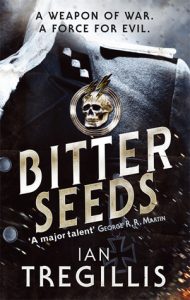Bitter Seeds by Ian Tregillis
 Bitter Seeds is the first book in Ian Tregillis’ Milkweed Triptych, and tells of an attempt to uncover and foil a covert and mysterious Nazi operation during World War II. British Intelligence operative Raybould Marsh discovers part of a film reel which seems to show Germans scientifically imbued with superhero-esque abilities, and he is determined to stop it: thus is born the ultra-secret Project Milkweed. After a series of defeats at the hands of the Germans, it appears the war is all but lost; however, the British are not without their own secret weapon . . . but using it comes with a heavy price.
Bitter Seeds is the first book in Ian Tregillis’ Milkweed Triptych, and tells of an attempt to uncover and foil a covert and mysterious Nazi operation during World War II. British Intelligence operative Raybould Marsh discovers part of a film reel which seems to show Germans scientifically imbued with superhero-esque abilities, and he is determined to stop it: thus is born the ultra-secret Project Milkweed. After a series of defeats at the hands of the Germans, it appears the war is all but lost; however, the British are not without their own secret weapon . . . but using it comes with a heavy price.
I recently read The Violent Century by Lavie Tidhar, and the general premise is the same: what if there were soldiers with special powers, and how would they affect the war? However, while Tidhar’s Ubermensch are born with their powers, Tregillis’ soldiers are the result of horrific scientific experiments who are only able to utilise their abilities through having surgery to connect their brains to a special battery. The most notable of these are Reinhardt, who can harness heat; Gretel, who can see the future (but doesn’t always choose to share it with others); and Klaus, who is one of the main POV characters and can walk through walls.
The story of the German super soldiers is really interesting, particularly at the start when we don’t know very much about them apart from the hints in a damaged and creepy film reel. However, I felt that the British answer to them – the Eidolons – was a bit ridiculous, and was somewhat shoe-horned into the story. I would have preferred to see the British using their wits and strategy to overcome the scientifically superior German soldiers, rather than resorting to improbable supernatural forces. Saying that, I did like that the Eidolons came with a price, and that the author used the character of William to explore the argument of whether or not it is right to sacrifice a few for the needs of the many.
For me, one of the things that really stood out about Tregillis’ writing was the vivid descriptions. Whether the author is describing a battleground, a car journey, a pub, or just a man sitting in an office, he makes you feel as though you’re actually there: you can feel the heat of the explosions, hear the tick of the car’s engine, see the condensation on the pint glass and smell the smoke from the match used to light a cigarette. The author does a great job re-creating the wartime atmosphere, and his focus on the senses really helps bring every single scene, big or small, to life. Highly recommended.
